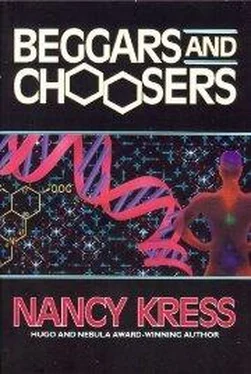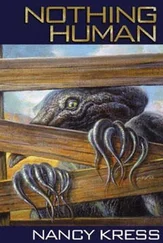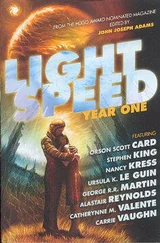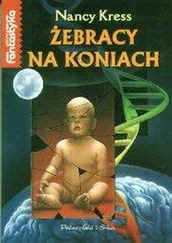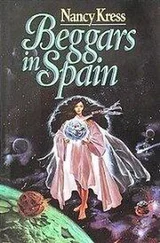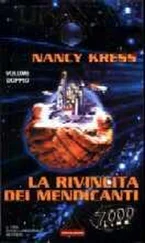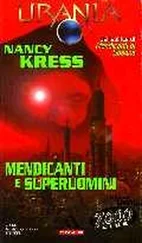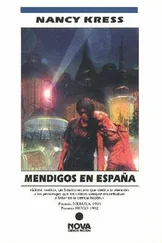“For the transplant market,” Carmela said. “But then, you probably already knew about that, too?”
I had, but didn’t say so.
“These are luckier,” she continued. “We can remove the extra limbs and return them to normal bodies. In fact, Jessie is scheduled for surgery on Tuesday.”
I didn’t ask her which one was Jessie. The scotch made nauseous burbles in my stomach.
In the next room the two people looked normal. Dressed in pajamas, they lay asleep on a bed covered with a pretty chintz spread. Carmela didn’t lower her voice.
“They’re not sleeping, Mr. Arlen. They’re drugged, heavily, and will be for most of the rest of their lives. When they’re not, they’re in intense and constant pain. It’s caused by a tiny geno-mod virus designed to stimulate nerve tissue to an unbearable degree. The virus is injected and then replicates in the body — sort of like the Huevos Verdes Cell Cleaner. The pain is excruciating, but there’s no actual tissue damage, so theoretically it could continue for years. Decades. It was designed for the international torture market, and there was supposed to be an antidote to be administered. Or withheld. Unfortunately, the gene engineers working here had gotten only as far as the nanotorturer, not the antidote.”
One of the drugged pair — I saw now that it was a girl, barely past puberty — stirred uneasily and moaned.
“Dreaming,” Carmela said briefly. “We don’t know what. We don’t know who she is. Mexican maybe, kidnapped, or sold on the black market.”
“If you think that the research at Huevos Verdes is anything like—”
“No, it’s not. We know that. But the—”
“Everything researched and created from nanotechnology at Huevos Verdes is done with only the pubic benefit in mind. Everything . Like the Cell Cleaner.”
“I believe that,” Dr. Clemente-Rice said. She kept her voice low and controlled; I could feel the effort that cost her. “The Huevos Verdes applications are completely different. But the basic science, the breakthroughs, are similar. Only Huevos Verdes has gone much further, much faster. But others could close that gap if they had, for instance, the Cell Cleaner to dismantle and study.”
I stared at the sleeping girl. Her eyelids were puckered. My mother’s eyelids had done that, at the end of her life, when the bone cancer finally got her.
I said, “I’ve seen enough.”
“One more, Mr. Arlen. Please. I wouldn’t ask if it weren’t so urgent.”
I turned my chair to study her. She was a series of sharp pale ovals in my mind, with the same clean truthfulness as Maleck and the GSEA agents. Probably they had all been picked for just that quality. Then I suddenly realized who Carmela reminded me of: Leisha Camden. A weird pain shot through me, like a very thin lance.
I followed her through the last door in the corridor.
There were no genomod people in this room. Three heavy-duty shields shimmered from floor to ceiling, the kind that can keep out anything not nuclear. Behind them grew tall grass.
Carmela said softly, “You said that Huevos Verdes works only on genemods and nanotechs that are designed for the public benefit. So was this. It was commissioned by a Third World nation with terrible recurrent famines. The grass blades are edible. Unlike most plants, their cell walls are constructed not of cellulose but of an engineered substance that the human system can convert to monosaccharides. The grass is also amazingly hardy, fast-growing, self-seeding, and efficient in using nutrients from poor soils and water from arid ones. The engineers who developed it estimated that it could furnish six times the food of the most concentrated current farming.”
“Furnish food,” I repeated, idiotically. “Food…”
“We planted it in a controlled and shielded ecosphere of fifty ecologically diverse acres,” Carmela continued, her hands jammed into the pockets of her lab coat, “and within three months it had wiped out every other plant in the ecosphere. It’s so well fitted to thrive that it outcompeted everything else. Humans and some mammals can digest it; other animals cannot. The other plant eaters all starved, including so many larval insects that the insect population disappeared. The amphibian, reptile, and bird populations went with them, then the carnivorous mammals. Our computers figure that, given the right wind conditions, this grass would take about eighteen months to be the only thing left on Earth, give or take a few huge trees with extensive root systems that weren’t quite done dying.”
The grass rustled softly behind its triple shield. I felt something on my shoulders. Carmela’s hands. She turned my chair to face her, then immediately lifted her hands.
“You see, Mr. Arlen, we don’t think Huevos Verdes is evil. Not at all. We know Ms. Sharifi and her fellow SuperSleepless believe not only in the good of their research but in the good of the rest of us. We know she believes in the United States, as defined in the Constitution, as the best possible political arrangement in an imperfect world. Just as Leisha Camden did before her. I’ve always been a great admirer of Ms. Camden. But the Constitution works because it has so many checks and balances to restrain power.”
She licked her lips. The gesture wasn’t sexual; she was in such deadly earnest that I could feel her whole body dry and tense with strain.
“Checks and balances to restrain power. Yes. But there are no checks on Huevos Verdes. No restraints. No balances, because the rest of us simply can’t do what SuperSleepless can do. Unless they do it first. Then some of us could copy some of the tech, maybe, and adapt it. Some of us like the people who worked here”
I said nothing. The deadly, food-rich grass rustled.
“I can’t tell what you’re thinking, Mr. Arlen. And I can’t tell you what to think. But I — we — just wanted you to see all sides of the situation, with the hope you’ll think about what you’ve seen, and talk about it with Huevos Verdes. That’s all. The agents will take you back to Seattle now.”
I said, “What will happen to this grass?”
“We’ll destroy it with radiation. Tomorrow. Not so much as a strand of DNA will be left, and none of the records, either. It only existed this long so we could show it to Ms. Sharifi, or, failing that, to you.”
She led me back to the elevator, and I watched her body, taut with unhappiness and hope, walk gracefully between the narrow white walls.
Just before the elevator door opened I said to her, or maybe to all three of them, “You can’t stop technological progress. You can slow it down, but it always comes anyway.”
Carmela Clemente-Rice said, “Only two nuclear bombs have ever been dropped on Earth as an act of wartime aggression. The science was there, but the applications were left unused. By cooperation or restraint or fear or force — the applications were stopped.” She held out her hand. It was damp and clammy, but something electric ran from her touch to mine. The navy-blue eyes beseeched me.
Just as if / held actual power over what Huevos Verdes did.
“Good-bye, Mr. Arlen.”
“Good-bye, Dr. Clemente-Rice.”
The agents, good as their word, returned me to my hotel room in Seattle. I sat down to wait to see who would arrive from Huevos Verdes, and how long it would take.
It was Jonathan Markowitz, at five in the morning. I’d had three hours’ sleep. Jonathan was perfect. His tone was civil and interested. He asked about everything I’d seen, and I described everything to him. He asked a lot of other questions: Did I experience any temperature changes, no matter how slight, at any point in the corridor? Did I ever smell anything like cinammon? Did the light have a greenish tinge? Did anyone ever touch me? He didn’t argue against anything Carmela Rice-Clemente had told me. He treated me like a member of the team whose loyalty was unquestioned, but who might have been tampered with in ways I couldn’t understand. He was perfect.
Читать дальше
